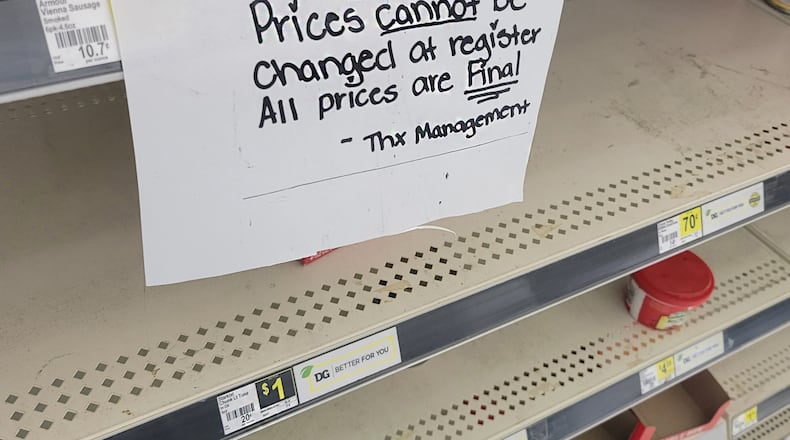They received a letter from St. Clair Twp. resident William Anderson and began conducting price verification checks at all the county Dollar General stores on Oct. 14. The results have shown double-digit error rates up to 88%. A store is allowed only a plus or minus 2% error rate.
“This is a serious problem,” Reynolds said. “A customer could be charged substantially more than the listed shelf price and that amounts to a form of consumer fraud. During these inflationary times, people turn to stores like these to get some bargains. Instead, in too many instances they are being over charged.”
Anderson, in his letter, noted that the store at 950 S. Main in Hamilton had a sign posted by the management that read “Prices cannot be changed at the register. All prices are final.” He stated, “That is dishonest — as the shelf price may say two boxes of cereal for $6.00 but when I get to the register it’s $7.00 or higher! Can’t they use the price on the shelf — or at least change them every week?”
Reynolds’ office said that type of signage is problematic because the price on the shelf is the advertised price and should be honored. The sign was also posted at the store when the auditor’s Weights and Measures manager visited.
Anderson told the Journal-News he went back to the store looking for Halloween candy Wednesday and there were no price tags on those items, “they said you’ve got to go to the cash register to find out what it costs, like they’re playing a bait and switch on me.”
Some examples of the price difference are at the 1425 Millville Road store:
- Nestle Coffee Mate creamer had a shelf price of $2 but scanned at $4.35.
- Hefty solo cups had a shelf price of $4.25 but scanned at $5.95.
- Perdue Chicken Strips had a shelf price of $7.95 but scanned at $10.75.
- Pillsbury Grands biscuits had a shelf price of $3 but scanned at $3.75.
The Ohio Department of Agriculture (ODA), which oversees weights and measures in the state, has been notified of the pricing problems at Dollar General and are looking into the matter.
The Journal-News asked the ODA about the potential consequences for Dollar General all they said was, “We were just made aware of the findings yesterday, we are in the initial phase of looking into the matter.”
The auditor’s Office Weights and Measures Department ensures that the labeled shelf price or the advertised price matches the price charged at the checkout. A store is allowed a plus or minus 2% error rate. The 2% is calculated on the total number of items tested. If 50 items are scanned, the store can only have one item scan incorrectly.
The highest number of erroneous price checks were at the Hamilton Eaton Road store in Hamilton where 17 items were checked and 15 had different prices for an 88.2% fail rate.
At most of the stores, a consistent error was found with products advertised for a lesser price if two or three or more of the products were purchased. The reduced price was not reflected at checkout. In some instances, managers said they would enter the correct advertised price if a customer complained.
At one store, on College Corner Pike in Oxford all the pricing errors were in the customers’ favor.
This has happened elsewhere nationwide. In 2019 Dollar General reached a $1.75 million settlement with the state of Vermont for violating the state’s Consumer Protection Act, according to a release from Vermont’s Attorney General’s Office. Dollar General resolved claims that it sold products that were advertised on the shelf at a lower price than the price at the register, even after being told at least 50 times by state inspectors to correct the pricing inaccuracies.
The Journal-News reached out to Dollar General, but no one responded.
About the Author

